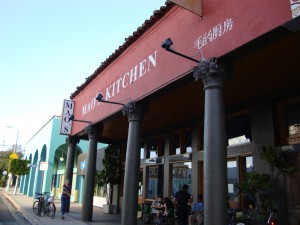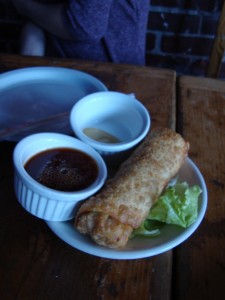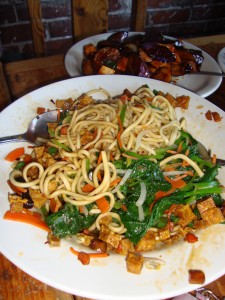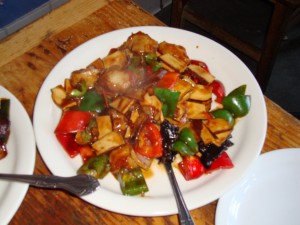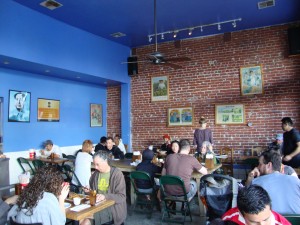THE WHITE HOUSE
Office of the Press Secretary
________________________________________________________________
For Immediate Release June 7, 2013
REMARKS BY PRESIDENT OBAMA
AND PRESIDENT XI JINPING OF THE PEOPLE’S REPUBLIC OF CHINA
AFTER BILATERAL MEETING
Sunnylands Retreat
Rancho Mirage, California
8:09 P.M. PDT
PRESIDENT OBAMA: Everybody ready? Well, I know we’re a little behind, but that’s mainly because President Xi and I had a very constructive conversation on a whole range of strategic issues, from North Korea to cyberspace to international institutions. And I’m very much looking forward to continuing the conversation, not only tonight at dinner but also tomorrow.
But I thought we’d take a quick break just to take a question from both the U.S. and Chinese press. So what I’ll do is I’ll start with Julie Pace and then President Xi can call on a Chinese counterpart.
Q Thank you, Mr. President. How damaging has Chinese cyber-hacking been to the U.S.? And did you warn your counterpart about any specific consequences if those actions continue? And also, while there are obviously differences between China’s alleged actions and your government’s surveillance programs, do you think that the new NSA revelations undermine your position on these issues at all during these talks?
And President Xi, did —
PRESIDENT OBAMA: Why don’t you let the interpreter —
Q And President Xi, did you acknowledge in your talks with President Obama that China has been launching cyber attacks against the U.S.? Do you also believe that the U.S. is launching similar attacks against China? And if so, can you tell us what any of the targets may have been? Thank you.
PRESIDENT OBAMA: Well, Julie, first of all, we haven’t had, yet, in-depth discussions about the cybersecurity issue. We’re speaking at the 40,000-foot level, and we’ll have more intensive discussions during this evening’s dinner.
What both President Xi and I recognize is that because of these incredible advances in technology, that the issue of cybersecurity and the need for rules and common approaches to cybersecurity are going to be increasingly important as part of bilateral relationships and multilateral relationships.
In some ways, these are uncharted waters and you don’t have the kinds of protocols that have governed military issues, for example, and arms issues, where nations have a lot of experience in trying to negotiate what’s acceptable and what’s not. And it’s critical, as two of the largest economies and military powers in the world, that China and the United States arrive at a firm understanding of how we work together on these issues.
But I think it’s important, Julie, to get to the second part of your question, to distinguish between the deep concerns we have as a government around theft of intellectual property or hacking into systems that might disrupt those systems — whether it’s our financial systems, our critical infrastructure and so forth — versus some of the issues that have been raised around NSA programs.
When it comes to those cybersecurity issues like hacking or theft, those are not issues that are unique to the U.S.-China relationship. Those are issues that are of international concern. Oftentimes it’s non-state actors who are engaging in these issues as well. And we’re going to have to work very hard to build a system of defenses and protections, both in the private sector and in the public sector, even as we negotiate with other countries around setting up common rules of the road.
And as China continues in its development process and more of its economy is based on research and innovation and entrepreneurship, they’re going to have similar concerns, which is why I believe we can work together on this rather than at cross-purposes.
Now, the NSA program, as I discussed this morning, is a very limited issue, but it does have broad implications for our society because you’ve got a lot of data out there, a lot of communications that are in cyberspace. And how we deal with both identifying potential terrorists or criminals, how the private sector deals with potential theft, and how the federal government, state governments, local governments and the private sector coordinate to keep out some of these malicious forces while still preserving the openness and the incredible power of the Internet and the web and these new telecommunications systems — that’s a complicated and important piece of business. But it’s different from these issues of theft and hacking.
And every government is then inevitably going to be involved in these issues, just like big companies are going to be involved in these issues. I mean, you’ve got private companies that have a lot more data and a lot more details about people’s emails and telephone calls than the federal government does. And if we’re called upon not only to make sure that we’re anticipating terrorist communications but we’re also called upon to work with the private sector to prevent theft out of ATMs, et cetera, then we’re going to have to find ways to deal with this big data in ways that are consistent with our values; in ways that protect people’s privacy, that ensure oversight, and strike the right balance.
And as I indicated this morning, that’s a conversation that I welcome having.
PRESIDENT XI: (As interpreted.) As President Obama said, in our meeting this afternoon we just briefly touched upon the issue of cybersecurity. And the Chinese government is firm in upholding cybersecurity and we have major concerns about cybersecurity.
In the few days before President Obama and I meet today, I note sharp increased media coverage of the issue of cybersecurity. This might give people the sense or feeling that cybersecurity as a threat mainly comes from China or that the issue of cybersecurity is the biggest problem in the China-U.S. relationship.
The application of new technology is a double-edged sword. On the one hand, it will drive progress in ensuring better material and cultural life for the people. On the other hand, it might create some problems for regulators and it might infringe upon the rights of states, enterprises, societies and individuals.
We need to pay close attention to this issue and study ways to effectively resolve this issue. And this matter can actually be an area for China and the United States to work together with each other in a pragmatic way. And I’m happy to learn that within the context of the China-U.S. strategic and economic dialogue, a working group has been established to discuss cybersecurity issues. So this is an issue that the two sides will continue to discuss.
By conducting good-faith cooperation we can remove misgivings and make information security and cybersecurity a positive area of cooperation between China and the U.S. Because China and the United States both have a need and both share a concern, and China is a victim of cyber attacks and we hope that earnest measures can be taken to resolve this matter.
Thank you.
Q I’m with China Central Television and my question for President Xi is, what are the main issues that were discussed in the longer-than-expected meeting this afternoon? And what are the major areas of consensus that have emerged from the discussion? And last year, when you were visiting the United States, you raised the concept of the two sides working together to explore what you call a new model of major country relationship, something that is unprecedented in the relationship and that can inspire future generations. And after this concept was raised, there has been much discussion and comment on it, both in China and the United States and in the world more broadly. So did you have further discussion on this issue in your meeting this afternoon?
And my question for President Obama is, what will the United States do to contribute to the building of a new model of major country relationship between China and the U.S.?
PRESIDENT XI: (As interpreted.) In the first meeting that I’ve had with President Obama this afternoon, we had an in-depth, sincere and candid discussion on the domestic and foreign policies of China and the United States, on our joint work to build a new model of major country relationship, and our international and regional issues of mutual interest. And the President and I reached important consensus on these issues.
I stated very clearly to President Obama that China will be firmly committed to the path of peaceful development and China will be firm in deepening reform and opening up the country wider to the world. China will work hard to realize the Chinese dream of the great national renewal and will work hard to push forward the noble cause of peace and development for all mankind.
By the Chinese dream, we seek to have economic prosperity, national renewal and people’s well-being. The Chinese dream is about cooperation, development, peace and win-win, and it is connected to the American Dream and the beautiful dreams people in other countries may have.
President Obama and I both believe that in the age of economic globalization and facing the objective need of countries sticking together in the face of difficulties, China and the United States must find a new path — one that is different from the inevitable confrontation and conflict between the major countries of the past. And that is to say the two sides must work together to build a new model of major country relationship based on mutual respect and win-win cooperation for the benefit of the Chinese and American peoples, and people elsewhere in the world.
The international community looks to China and the United States to deliver this. When China and the United States work together, we can be an anchor for world stability and the propeller of world peace.
I stand ready to work with President Obama to expand on all levels of exchanges between the two sides. I look forward to maintaining close communication with the President through mutual visits, bilateral meetings, exchange of letters and phone calls. And I invited President Obama to come to China at an appropriate time for a similar meeting like this. And we look forward to visiting each other country.
At the same time, the two sides will work hard to make progress in the various bilateral mechanisms, such as the strategic and economic dialogue and the high-level consultation on people-to-people exchange. Also, the Chinese Minister of Foreign Affairs and the Chinese Minister of National Defense will both make visits to the United States within the year.
Our two sides should also step up exchanges and cooperation in economy and trade, energy, environment, people-to-people, and cultural fields, as well as at the sub-national level, so that we can deepen the shared interests of the two countries and expand them to all areas.
We should also improve and strengthen the military-to-military relationship between the two countries and promote the building of a new model of military relationship between the two sides. The two sides should also improve coordination microeconomic policies so that by strengthening cooperation, we can contribute to our respective development at home, and promote strong, sustainable and balanced economic growth in the Asia Pacific region and the world at large.
And I’m confident in our joint effort to build a new model of major country relationship. I believe success hinges on the human effort. Firstly, both sides have the political will to build this relationship. Secondly, our cooperation in the last 40 years provides a good foundation for us to build on. Thirdly, between China and the United States, there are over 90 intergovernmental mechanisms which provide the institutional underpinning for our efforts.
Fourth, there is strong public support for this kind of relationship between China and the United States. There are 220 pairs of sister provinces, states and cities between China and the U.S. There are 190,000 Chinese students in the United States, and 20,000 American students in China.
And 5th, there is enormous scope for future cooperation between China and the U.S.
Of course, this endeavor is unprecedented and one that will inspire future generations. So we need to deepen our mutual understanding, strengthen our mutual trust, further develop our cooperation and manage our differences so that we can avoid the traditional path of inevitable confrontation between major countries and really embark on a new path.
The Chinese nation and American nation are great nations, and the Chinese people and American people are great peoples. As long as we stand high and look far, as long as we make specific progress and accumulate them over time, as long as we maintain confidence and determination, as long as we have wisdom and patience, I’m confident that we will succeed in achieving this historical mission.
I’m sorry for going too long. Thank you.
PRESIDENT OBAMA: Well, I think President Xi summarized very well the scope of our conversations. We spoke about some very specific issues — for example, President Xi mentioned the importance of military-to-military communications. In the past, we’ve had high-level diplomatic communications about economic and strategic issues, but we haven’t always had as effective communications between our militaries. And at a time when there’s so much activity around the world, it’s very important that we each understand our strategic objectives at the military as well as the political levels. So that’s an example of concrete progress that can advance this new model of relations between the United States and China.
So we’ll be taking steps to institutionalize and regularize such discussions. But more broadly, I think President Xi identified the essence of our discussions in which we shared our respective visions for our countries’ futures and agreed that we’re more likely to achieve our objectives of prosperity and security of our people if we are working together cooperatively, rather than engaged in conflict.
And I emphasized my firm belief to President Xi that it is very much in the interest of the United States for China to continue its peaceful rise, because if China is successful, that helps to drive the world economy and it puts China in the position to work with us as equal partners in dealing with many of the global challenges that no single nation can address by itself.
So, for example, neither country by itself can deal with the challenge of climate change. That’s an issue that we’ll have to deal with together. China as the largest country, as it continues to develop, will be a larger and larger carbon emitter unless we find new mechanisms for green growth. The United States, we have the largest carbon footprint per capita in the world; we’ve got to bring down our carbon levels in order to accommodate continued growth. And so that will translate then into opportunities for specific work around green technologies and research and development, and interactions between our scientists so that we can, together, help advance the goal of a sustainable planet, even as we continue to grow and develop.
We’ve got a lot of work to do to take these broad understandings down to the level of specifics, and that will require further discussions not only today and tomorrow, but for weeks, months, years to come. But what I’m very encouraged about is that both President Xi and myself recognize we have a unique opportunity to take the U.S.-China relationship to a new level. And I am absolutely committed to making sure that we don’t miss that opportunity.
Thank you very much, everybody.
END 8:47 P.M. PDT
 On Facebook
On Facebook By Email
By Email 